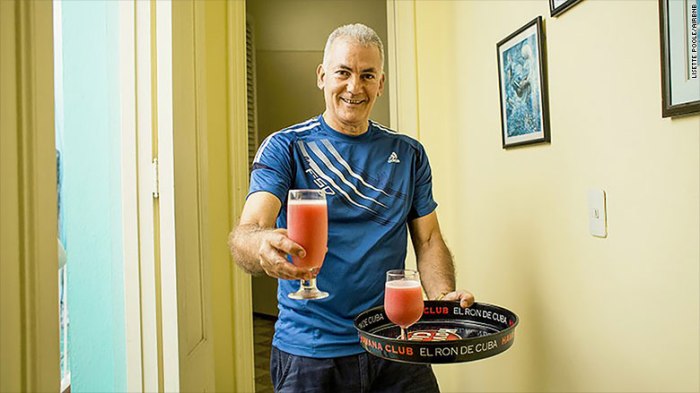Airbnb’s Expansion into Cuba
Airbnb’s expansion into Cuba, specifically targeting US travelers, marks a significant milestone in the evolving relationship between the two countries. This move reflects the thawing of decades-long tensions and the opening up of Cuba to American tourists.
Historical Context and Recent Changes in US-Cuba Relations
The expansion of Airbnb into Cuba is directly linked to the recent changes in US-Cuba relations. After decades of strained relations, the Obama administration began to ease restrictions on travel and trade with Cuba in 2014. This led to a surge in American tourists visiting the island nation, creating an opportunity for Airbnb to establish its presence.
Airbnb’s Regulations and Guidelines for Operations in Cuba
Airbnb has implemented specific regulations and guidelines for its operations in Cuba to ensure compliance with both US and Cuban laws. These guidelines include:
* Accommodation Types: Airbnb only allows rentals of “casas particulares,” which are privately owned homes. This aligns with the Cuban government’s policy of promoting tourism through small businesses and local communities.
* Payment Methods: Airbnb transactions are facilitated through its platform, but the company works with Cuban financial institutions to ensure payments are processed in accordance with US and Cuban regulations.
* Restrictions on US Travelers: Airbnb operates under the “people-to-people” travel category, which requires US travelers to engage in cultural exchange activities while in Cuba. This ensures that travelers are not solely focused on leisure activities but are contributing to the understanding and appreciation of Cuban culture.
Impact on Cuban Tourism
Airbnb’s expansion into Cuba has the potential to significantly impact the country’s tourism sector, bringing both opportunities and challenges. While the platform could contribute to economic growth and job creation, it also raises concerns about infrastructure limitations and cultural sensitivities.
Economic Growth and Job Creation
Airbnb’s platform could significantly contribute to economic growth and job creation in Cuba. By providing a wider range of accommodation options, it could attract more tourists, leading to increased spending in the country. Airbnb could also create new jobs in sectors such as hospitality, transportation, and tourism services.
Airbnb’s expansion could create opportunities for Cuban entrepreneurs and small businesses to participate in the tourism sector.
Challenges of Airbnb’s Expansion
Airbnb’s expansion into Cuba faces several challenges.
Infrastructure Limitations
Cuba’s tourism infrastructure, including transportation, internet access, and utilities, is still developing. The influx of tourists from Airbnb could strain existing infrastructure and lead to issues such as traffic congestion and unreliable services.
Cultural Sensitivities
Airbnb’s expansion could also raise concerns about cultural sensitivities. The influx of tourists could lead to changes in Cuban culture and traditions, potentially impacting the local way of life.
Regulation and Compliance
Cuba’s government has implemented regulations for the tourism sector, and Airbnb’s operations must comply with these regulations. These regulations could include licensing requirements, taxes, and restrictions on certain types of accommodation.
Travel Experiences for US Travelers
The opening of Cuba to US travelers has brought about a surge in interest in experiencing the island’s rich culture and history. Airbnb has become a popular platform for US travelers seeking authentic and unique accommodations and experiences.
Types of Accommodations and Experiences
Airbnb offers a wide range of accommodations in Cuba, catering to various budgets and preferences. US travelers can choose from:
- Casas Particulares: These are privately owned homes that offer rooms for rent. They provide a unique opportunity to experience Cuban hospitality and daily life firsthand.
- Apartments: Modern apartments, often located in urban areas, offer more privacy and amenities than traditional casas particulares.
- Villas and Estates: For larger groups or those seeking luxurious accommodations, Airbnb offers a selection of villas and estates with private pools, gardens, and other amenities.
Beyond accommodations, Airbnb connects US travelers with local experiences, such as:
- Cooking classes: Learn to prepare traditional Cuban dishes from local chefs.
- Music and dance lessons: Immerse yourself in Cuban culture through music and dance classes.
- Day trips and excursions: Explore the island’s natural beauty and historical sites with local guides.
Advantages and Disadvantages of Booking Through Airbnb
Advantages:
- Authentic experiences: Airbnb offers a more authentic and personalized experience compared to traditional hotels, allowing travelers to interact with local families and gain a deeper understanding of Cuban culture.
- Variety of options: Airbnb provides a wider range of accommodation options than traditional travel agencies, catering to different budgets and preferences.
- Flexibility and convenience: Airbnb allows travelers to book accommodations and experiences directly, offering greater flexibility and convenience than traditional agencies.
- Lower prices: Airbnb often offers more competitive prices compared to traditional hotels and travel agencies.
Disadvantages:
- Language barrier: Communication can be challenging for US travelers who do not speak Spanish, as many hosts and experiences may not be fluent in English.
- Lack of amenities: Some accommodations, particularly casas particulares, may lack certain amenities that are standard in traditional hotels.
- Limited customer support: Airbnb’s customer support may be less responsive compared to traditional travel agencies, especially in cases of unexpected issues or emergencies.
Cultural and Historical Attractions
Airbnb allows US travelers to explore Cuba’s rich cultural and historical attractions, such as:
- Havana: The capital city, Havana, is a vibrant mix of colonial architecture, lively music, and a rich history. Travelers can explore the historic Old Havana district, visit the iconic Malecon, and enjoy live music at the numerous bars and clubs.
- Trinidad: This UNESCO World Heritage Site is known for its beautifully preserved colonial architecture, cobblestone streets, and charming plazas. Travelers can explore the town’s history, visit the nearby Valley of the Sugar Mills, and enjoy traditional Cuban music and dance performances.
- Viñales Valley: This picturesque valley is renowned for its stunning landscape, tobacco plantations, and cave paintings. Travelers can explore the valley on horseback, hike through the lush vegetation, and visit local tobacco farms.
- Varadero Beach: This popular beach destination offers pristine white sand beaches, crystal-clear waters, and a range of water sports activities. Travelers can relax on the beach, swim in the ocean, and enjoy the vibrant nightlife.
Ethical Considerations: Airbnb Expands To Cuba Only For U S Travelers
Airbnb’s expansion into Cuba, while offering exciting opportunities for travel and cultural exchange, also raises significant ethical concerns. The potential impact on local communities, the Cuban economy, and the very fabric of Cuban life must be carefully considered.
The Impact on Local Communities
The influx of tourists through Airbnb could potentially lead to gentrification, displacing local residents from their neighborhoods. As demand for short-term rentals increases, landlords may choose to prioritize higher-paying tourists over long-term residents, driving up rents and making housing unaffordable for many Cubans. This could disrupt the social fabric of communities and exacerbate existing inequalities.
The Cuban Economy and Sustainable Development
Airbnb’s presence in Cuba could have both positive and negative implications for the Cuban economy. While it offers an alternative to traditional hotels and provides income opportunities for locals, it also raises concerns about the distribution of economic benefits. A significant portion of the revenue generated by Airbnb might flow out of the country, benefiting foreign companies and investors rather than Cuban businesses and individuals. This could further widen the gap between the wealthy and the poor, undermining efforts towards sustainable development.
Cultural Exchange and Understanding
Airbnb has the potential to foster cultural exchange and understanding between US and Cuban travelers. By offering home-stays and local experiences, Airbnb can connect travelers with Cuban families and communities, providing a more authentic and immersive travel experience. This can help break down stereotypes and promote greater understanding between the two countries. However, it is crucial to ensure that cultural exchange occurs in a respectful and ethical manner, avoiding the exploitation of local communities and preserving the authenticity of Cuban culture.
Future Outlook
The integration of Airbnb into Cuba’s tourism landscape holds significant implications for the country’s future. As Airbnb continues to grow its presence, it will undoubtedly shape the trajectory of Cuban tourism, creating both opportunities and challenges.
Long-Term Impact on Cuban Tourism
Airbnb’s expansion into Cuba is likely to have a profound impact on the country’s tourism industry. The platform’s unique model, offering a diverse range of accommodation options, has the potential to democratize tourism, making it more accessible to a wider range of travelers. This could lead to an increase in tourist arrivals, particularly from the United States, contributing to economic growth and job creation in Cuba. However, it is essential to consider the potential challenges associated with Airbnb’s growth, such as the impact on traditional hotels and the need to ensure responsible and sustainable tourism practices.
Opportunities for Airbnb to Expand its Services and Offerings in Cuba
Airbnb has a significant opportunity to expand its services and offerings in Cuba. The platform could explore partnerships with local businesses, such as restaurants, tour operators, and cultural institutions, to create unique and immersive travel experiences for its guests. This could involve offering curated itineraries, authentic culinary experiences, and opportunities to engage with local communities. Airbnb could also leverage its technology to develop innovative solutions for travelers, such as online booking systems for tours and activities, mobile payment options, and language translation tools.
Airbnb’s Role in Fostering Sustainable Tourism Practices in Cuba, Airbnb expands to cuba only for u s travelers
Airbnb has the potential to play a significant role in fostering sustainable tourism practices in Cuba. By promoting eco-friendly accommodations and experiences, Airbnb can encourage travelers to minimize their environmental footprint. The platform can also work with local communities to develop sustainable tourism initiatives that benefit both visitors and residents. Examples of this include supporting local businesses, promoting responsible waste management, and preserving cultural heritage.
Airbnb expands to cuba only for u s travelers – Airbnb’s expansion into Cuba is a complex issue with both potential benefits and challenges. It’s a move that could help to boost the Cuban economy and bring new opportunities for its people, but it also raises concerns about the impact on local communities and the potential for gentrification. Only time will tell what the long-term impact of Airbnb’s presence in Cuba will be, but it’s a development that is sure to have a significant impact on the island nation.
Airbnb’s recent expansion into Cuba, exclusively for US travelers, is a move that could shake up the travel industry. While the focus is on the Caribbean, the news also makes us wonder if this could be a sign of things to come. After all, we’ve recently heard whispers of Virgin Galactic entering the electric car market, richard branson hints virgin could compete with tesla , and it’s clear that disruptors are looking for new frontiers.
Could Airbnb’s Cuba move be a prelude to a wider global expansion, much like Branson’s potential foray into the automotive world?
 Standi Techno News
Standi Techno News

